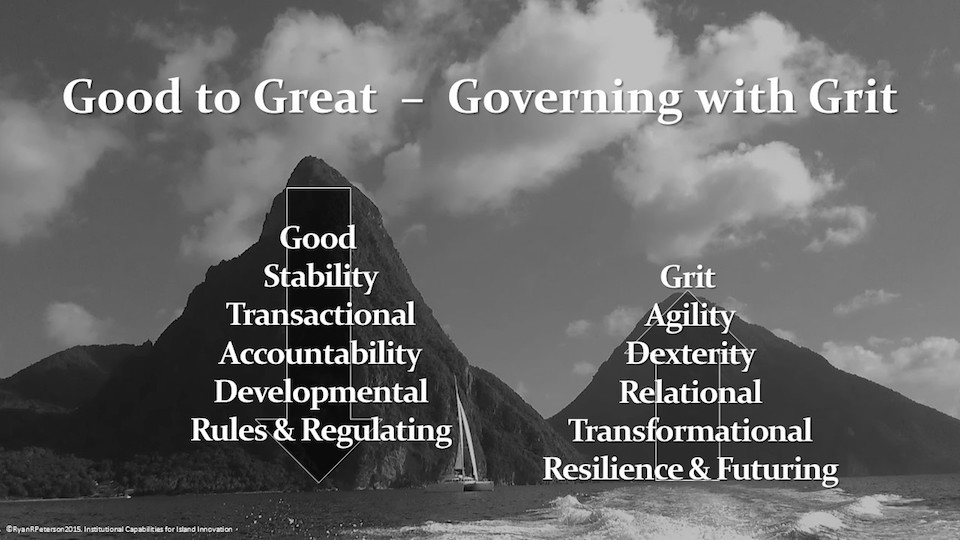A new approach
By Ryan Peterson
CJ Contributor
”Sitting on a beach, suddenly I feel a breeze, staring at the horizon far across the seas.
Storming ahead across the ocean, swiftly I bare my sails, steering clear from commotion” -LK
It has been a stormy season for the Caribbean, one that has no signs of letting go. Despite all the radars and readiness, we are often still caught by surprise and devastation, including the loss of precious life. While we may look backward and resort to ask ‘why’ (did we wait) and ‘who’ (is responsible), the real question is ‘how’ to look forward, and reconsolidate that we govern our own future.
To the casual observer this difference may seem trivial, but underlying the quest(ion) for governance is a paradigmatic shift in views and values, one that I must profess, will not be resolved by rules of law, or writings in a digital journal. Akin to staring at a steep mountain ascent, we would do well to view and value our island-scapes from a different perspective, and steer a transformative course towards not only transforming, but more importantly governing Caribbean futures.
The quest for governance has been an enduring journey in the Caribbean. Add adjectives such as ‘self’ or ‘good’, and one is likely to trace back the roots for decennia. While the search for (good) governance endures in the Caribbean, research indicates that despite rigorous attempts and achievements at improving Caribbean governance, in terms of rules of law, political stability, regulations, etc, the quality of governance – a.k.a. governability – has declined for over a decade, with dire implications for socio-ecological development and inclusiveness.
The governance-growth nexus demonstrates a disruptive cycle of increasing vulnerability, originating not from external disruptions or debts, but rather, from internal fragility and deficits. This paradox of governability – more rules, less resilience – persists, and may well be attributed to that fact that good (ordinary) governance is not fitting for our island times (was it ever?), and simply ‘ain’t good e’nuf’ for governing Caribbean futures.
Simply doing more of the ordinary under extra-ordinary conditions is not conducive to creating a new Caribbean. Whereas ordinary good governance is necessary for managing stability and absorbing shocks, research indicates that it is not sufficient for manoeuvring with agility and flexibility. While good governance is certainly required for transparency and transactional efficiency, it does not deliver the resilience for systemic transformation. Rather than seek to maintain the status quo and govern to restore, the Caribbean needs to challenge the status quo, and govern for transformative resilience. In effect, from good to great by governing with grit.
Transformative resilience requires grit, an ability and attitude of persistence, endurance, evolution, reinvention, resilience, and above all, nurturing a culture of dexterity.
Grit for governance travels beyond rules and regulations, and shifts the focus towards new entrepreneurial relationships (that can withstand political cycles), institutional innovation (that can overcome institutional memories), and value transformation (that disrupts cultural inertia and the classical ‘this we culture’).
Governing with grit acknowledges the inherent and often contradictory pressures for development in small island dynamic states.
Rather than assume stability and continuity, grit for governance operates under the assumption of instability, innovation, and leading from discontinuities. Governing with grit requires a different dynamically-stable architecture, in which top-down regulating evolves towards bottom-up ‘futuring’.
Rather than focus on the efficiency and transparency of (existing) regulatory capacities, governing with grit emphasises the nimbleness of agile networks with dexterity from an emerging future. Beyond mere forecasting, it necessitates an active anticipatory forward-motion to steer clear from commotion and other disruptive forces and shocks.
Grit for governance isn’t about reforms or new rules, it’s about reconfiguring the institutional eco-system from the inside-out.
Governing with grit gives true meaning to the Caribbean fisherman art of steersmanship when facing rough conditions at sea.
Rather than simply weather out the storm, a gritty fisherman always has a keen eye on the horizon, and knows how to adjust the sails for clear steering. To paraphrase Harry Belafonte, as soon as ya feel that sudd’n breeze, hois’ ya sail to future seas…
Ryan R. Peterson, PhD is Professor of Innovation & Sustainable Islands at the University of Aruba, and policy advisor on sustainable innovation in small states. He can be reached at ryan.peterson@ua.aw and followed @ryro_peterson

